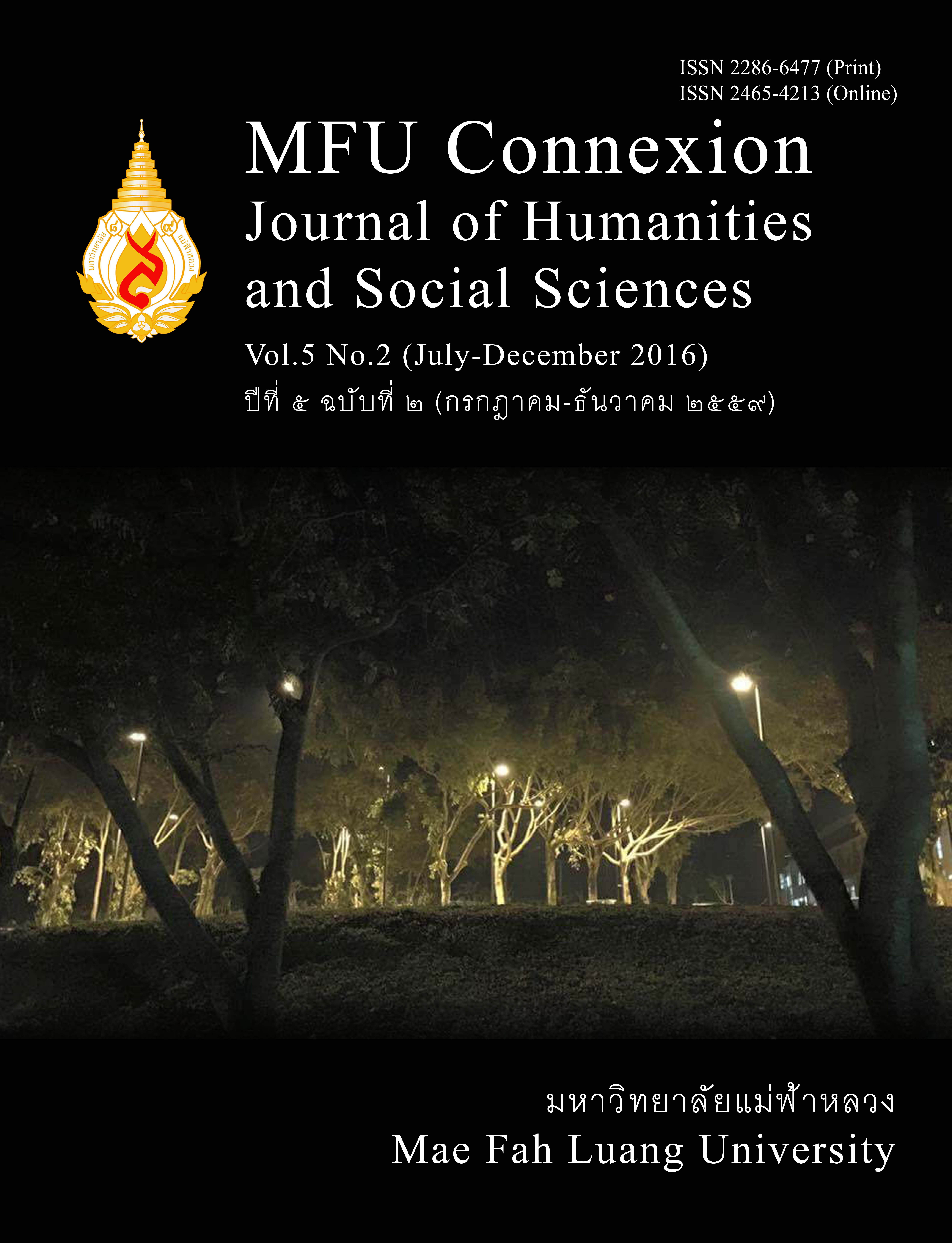Knowledge Management for Ensuring Land Security and Reducing Environment-distroying Behavior of People in Community: A Case Study in Mae Tha Sub-district, Mae On District, Chiang Mai Province (in Thai)
Main Article Content
Abstract
The objectives of this research were (1) to study the development of land holding in the community. (2) to study role and policy of Mae Tha Sub-district Administrative Organization on land security in an aspect of holding land for making an living and (3) to investigate community knowledge and its influences on land holding security and on reducing environmental destructive behavioral in the community of Mae Tha Sub-district, Mae On District , Chiang Mai Province. Quantitative and qualitative methods were utilized in this study. Data were obtained by using questionnaires distributed into 300 households in Mae Tha Sub-district., interviewing 60 people comprising of local government officers, community leaders and local scholars, and collecting data from historical documents and related ones. Content analysis was used for qualitative data, whereas the descriptive statistics was used for quantitative data analysis. The study found that the community utilized most of the plain lands for people’s residents and for their rice fields while high lands were used for plantation. The government had a policy of encouraging and supporting the community doing farming for money which leading to the dispute over the problems of farmer-land invasion and farmer land holding illegally. It was demanded to have a process for the solution of the dispute by cooperative from all parties concerned in the community including the local government agencies. By doing this it would be recognized and accepted by all people concerned which will be helpful for solving the problems and establishing a plan for land uses management. It was also affect the environmental behavioral concerns of the community by introducing live and district planning integrated with the community wisdom and knowledge in order to be able to manage and make use of limited natural resources in a sustainable way.
Article Details
Copyright
Connexion: Journal of Humanities and Social Sciences has an exclusive right to publish the accepted articles in any form. However, the author retains the following rights:
1. The right to the ownership of the article;
2. The right to use all or part of the article in his/her other works;
3. The right to re-produce the article for personal use or for use in the author’s organisation, in which case the author must obtain permission from Connexion: Journal of Humanities and Social Sciences;
4. The right to make copies of all or part of the work for educational use or for the author’s use in classroom teaching; and
5. The right to include the work (both the preprinted and printed versions) in an institutional repository.
References
การแก้ไขปัญหาที่ดินโดยองค์กรชุมชน, จาก https://www.codi.or.th/ [ค้นเมื่อ 24 เมษายน 2557].
กิตติศักดิ์ รัตนกระจ่างศรี. (2552) การจัดแนวเขตการใช้ที่ดินอย่างมีส่วนร่วมเพื่อจัดการความขัดแย้งในเขตป่าอนุรักษ์: กรณีศึกษาหมู่บ้านหิน เหล็ก ไฟ ตำบลดอยแก้ว อำเภอจอมทอง จังหวัดเชียงใหม่, วิทยานิพนธ์วิทยาศาสตรมหาบัณฑิต สาขาวิชาการใช้ที่ดินและการจัดการทรัพยากรธรรมชาติอย่างยั่งยืน, มหาวิทยาลัยเชียงใหม่.
เครือข่ายปฏิรูปที่ดินแห่งประเทศไทย (คปท.) กลุ่มปฏิบัติงานท้องถิ่นไร้พรมแดน. (2531) รายงานการวิจัยเชิงปฏิบัติการ เรื่อง กระบวนการปฏิรูปที่ดินและจัดการที่ดินอย่างยั่งยืนโดยประชาชน, นนทบุรี: เครือข่ายปฏิรูปที่ดินแห่งประเทศไทย (คปท.) กลุ่มปฏิบัติงานท้องถิ่นไร้พรมแดน.
จันทนา สุทธิจาริ. (2544) การมีส่วนร่วมของประชาชน การเมืองการปกครองไทยตามรัฐธรรมนูญฉบับประชาชน, กรุงเทพฯ: วี เจ พริ้นติ้ง.
เทอดศักดิ์ กองพรม. (2544) กระบวนการปลดปล่อยตนเองจากการเป็นหนี้สินอย่างยั่งยืน กรณีศึกษาบ้านห้วยทราย ตำบลแม่ทา อำเภอแม่ออน จังหวัดเชียงใหม่: รายงานการวิจัย, กรุงเทพฯ: สำนักงานกองทุนสนับสนุนการวิจัย.
นพรัตน์ ดวงแก้วเรือน. (2550) รายงานผลการดำเนินงานโครงการจัดการทรัพยากรธรรมชาติตำบลแม่ทา, เชียงใหม่: สถาบันพัฒนาทรัพยากรและเกษตรกรรยั่งยืนแม่ทา.
ปาริชาติ วลัยเสถียร และคณะ. (2543) กระบวนการและเทคนิคการทำงานของนักพัฒนา, กรุงเทพฯ: สำนักงานกองทุนสนับสนุนการวิจัย (สกวซ).
พรใจ เติมวารี. (2534) การเปลี่ยนแปลงความมั่นคงในการถือครองที่ดินในประวัติศาสตร์ ของสังคม ชนบทภาคเหนือ กรณีศึกษาหมู่บ้านในจังหวัดเชียงใหม่, วิทยานิพนธ์มานุษยวิทยามหาบัณฑิต, มหาวิทยาลัยธรรมศาสตร์.
พูนสิน เจือมประโคน และคณะ. (2547) องค์ความรู้เรื่องการจัดการที่ดินกับการพัฒนาเกษตรกรรมยั่งยืน: กรณีศึกษาชุมชนตำบลแม่ทา อำเภอแม่ออน จังหวัดเชียงใหม่: รายงานการวิจัย, เชียงใหม่ :โครงการนำร่องเพื่อพัฒนาเกษตรกรรมยั่งยืนของเกษตรกรรายย่อย ภูมินิเวศน์เชียงใหม่ลำพูน.
รัฐธรรมนูญแห่งราชอาณาจักรไทย พุทธศักราช 2550. (2550), กรุงเทพฯ: โรงพิมพ์ ศูนย์สื่อและสิ่งพิมพ์แก้วเจ้าจอม มหาวิทยาลัยราชภัฏสวนสุนันทา.
ราชบัณฑิตยสถาน. (2531) พจนานุกรมฉบับราชบัณฑิตยสถาน พ.ศ. 2525, พิมพ์ครั้งที่ 4, กรุงเทพฯ: อักษรเจริญทัศน์.
วิจารณ์ พานิช. (2548) การจัดการความรู้ ฉบับนักปฏิบัติ, กรุงเทพฯ: สุขภาพใจ.
วิทยา เต่าเสา. (2552) การเปลี่ยนแปลงการใช้ที่ดิน ทางการเกษตรและการปรับตัวของเกษตรกร: กรณีศึกษาบ้านทรายมูล ตำบลหนองปรือ อำเภอพนัสนิคม จังหวัดชลบุรี, วิทยานิพนธ์วิทยาศาสตรมหาบัณฑิต สาขาวิชาภูมิศาสตร์, มหาวิทยาลัยเชียงใหม่.
วิรัช วิรัชนิภาวรรณ. (2535) การบริหารและการจัดการทรัพยากรธรรมชาติ: บทบาทองค์กรท้องถิ่น, กรุงเทพฯ: โอเดียนสโตร์.
อคิน รพีพัฒน์, ม.ร.ว. (2527) การมีส่วนร่วมของชุมชนในการพัฒนาชนบทในสภาพสังคมและวัฒนธรรมไทย, กรุงเทพฯ: โรงพิมพ์ศักดิ์โสดาการพิมพ์.
อนัญญา ภุชงค์กุล (บรรณาธิการ). (2533) รัฐกับหมู่บ้านในไทยศึกษา, กรุงเทพฯ: สำนักพิมพ์มหาวิทยาลัยธรรมศาสตร์.
อานันท์ กาญจนพันธุ์. (2532) บริบททางสังคมของการเร่งรัดออกโฉนดที่ดินของรัฐ: กรณีศึกษาอำเภอจอมทอง จังหวัดเชียงใหม่: รายงานการวิจัย, เชียงใหม่: ภาควิชาสังคมวิทยาและมานุษยวิทยา คณะสังคมศาสตร์ มหาวิทยาลัยเชียงใหม่.
อัจฉรา รักยุติธรรม และคณะ. (2549) แอ่งดอยร้อยป่า ภูมิปัญญาการจัดการทรัพยากรชุมชนลุ่มน้ำแม่ทาตอนบน, เชียงใหม่: พงศ์สวัสดิ์การพิมพ์.


